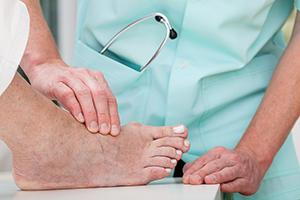
How to Treat Your Bunions
- posted: Jan. 14, 2019
Here is a helpful guide for how to manage your bunion symptoms.
 A bunion is one of the most common foot deformities to affect adults and it’s characterized as a bony protrusion that often juts out from the base of the big toe. Over time, you may even notice that the big toe leans in on the other toes. Read below to learn what you can do to reduce bunion pain and swelling, but if your feet are still experiencing pain and discomfort afterward, call our podiatrists in both Paoli and Philadelphia, Dr. Robert Cohen, Dr. Ushma Sheth, and Dr. Ira Meyers.
A bunion is one of the most common foot deformities to affect adults and it’s characterized as a bony protrusion that often juts out from the base of the big toe. Over time, you may even notice that the big toe leans in on the other toes. Read below to learn what you can do to reduce bunion pain and swelling, but if your feet are still experiencing pain and discomfort afterward, call our podiatrists in both Paoli and Philadelphia, Dr. Robert Cohen, Dr. Ushma Sheth, and Dr. Ira Meyers.
Swap Out Your Shoes
If you find that wearing shoes leads to pain and swelling around the bunion, it’s time to ditch those shoes and to find ones that offer a better fit. Any shoes that put pressure on the bunion can make the problem worse. It’s also important to avoid shoes with heels over 2 inches tall, as high heels can also put additional pressure on the deformity.
Ice Your Feet
If you have an ice pack or a bag of veggies in your freezer, either one can be wrapped in a towel and applied to the bunion to numb the pain and to reduce swelling. Just make sure never to leave the ice on your foot for more than 20 minutes at a time and never apply ice directly to the skin, as this can cause serious burns. If you have nerve damage in your feet, talk to our foot doctors before applying ice to the area.
Wear Protective Padding
While in an ideal world you wouldn’t have to wear shoes at all and you could just let your sore, achy feet breathe, we know that this isn’t feasible; however, one preventative measure that you can take to reduce pain and discomfort from wearing shoes all day is to apply a bunion pad over the bony protrusion before putting on shoes. Bunion pads are made from a variety of different materials, from cloth to gel, and they can prevent friction and pain from occurring when walking around in shoes.
Concerned? Give Us a Call!
If your symptoms don’t seem to be responsive to over-the-counter pain relievers or any of these methods above, then it’s time to schedule a visit with our podiatrists, who can devise a better and more effective treatment strategy for managing your bunion symptoms. Only in severe cases is bunion surgery recommended.
Paoli and Center City FootCare Centers has offices in both Paoli and Philadelphia, PA, to provide you with comprehensive foot and ankle care when you need it most. If you suspect that you might have a bunion, call one of our offices today to schedule an appointment: (610) 647-0400 for Paoli, and (215) 545-0388 for Philadelphia.
This website includes materials that are protected by copyright, or other proprietary rights. Transmission or reproduction of protected items beyond that allowed by fair use, as defined in the copyright laws, requires the written permission of the copyright owners.
